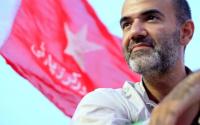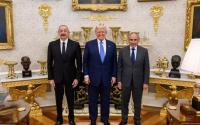14 December 2004Common Dreams
Long-term instability in Iraq could give birth to an "Iraqi Hitler" if citizens continue to feel humiliated and despondent, Iraqi President Ghazi Yawar has said.
Daily bombings and kidnappings have plagued Iraq since last year's U.S.-led invasion toppled Saddam Hussein and the relentless Sunni-led insurgency has crippled reconstruction and development projects in the country.
 File photo of Iraqi President Ghazi Yawar speaking during Iraqi national conference in Baghdad in August 2004. Yawar has said in an interview that long-term instability in his country could give birth to an "Iraqi Hitler" if citizens continued to feel humiliated and despondent. REUTERS/Ceerwan Aziz File photo of Iraqi President Ghazi Yawar speaking during Iraqi national conference in Baghdad in August 2004. Yawar has said in an interview that long-term instability in his country could give birth to an "Iraqi Hitler" if citizens continued to feel humiliated and despondent. REUTERS/Ceerwan Aziz |
Iraq's interim leaders have also come under fire for failing to reach out to some alienated factions and U.S.-led offensives on rebel-held cities have led to further divisions.
Yawar -- a Sunni Muslim who was chosen for the largely symbolic post of president in June -- also urged Iraq's neighbors to break their "negative silence" about attacks in Iraq and play a positive role in helping stabilize the country.
"When a fire breaks out in your neighbor's house you should act quickly to put it out, not only for the sake of your neighbor's but also so that you are not forced to put it out in your own home when it spreads there," the president said.
Earlier this month, Iraq and its neighbors made vague promises to improve security cooperation after a meeting in which Iraqi officials voiced growing frustration that neighboring states were not doing enough to halt the flow of people, arms and funds linked to guerrilla violence in Iraq.
Yawar, who has said that parliamentary elections should go ahead on time on January 30, told BBC radio that he expected more violence in Iraq aimed at derailing the landmark polls.
"Their tactical target is to undermine the electoral process and to stop us having our first elections. This is why we see it is a challenge we have to meet.
"The problem is we are not fearing representation, we are fearing the time of the elections. If people can feel safe enough to go and cast their vote," he said, adding that Iraq was "exploring all ideas" to ensure an acceptable majority of people voted as well as balanced representation in the assembly.
Most of the parties representing Iraq's Sunni Arabs, who make up about 20 percent of the country's 26 million population, recently called for the elections to be postponed for up to six months, saying a free and fair poll could not be held amidst the violence, most of which is affecting Sunni areas.
Yawar said the security situation could not be solved unless Iraqi forces became completely efficient. He said some former army and police officers with clean records should be reinstated, adding that Washington had made a mistake when it dissolved the defense and interior ministries.






